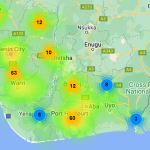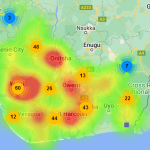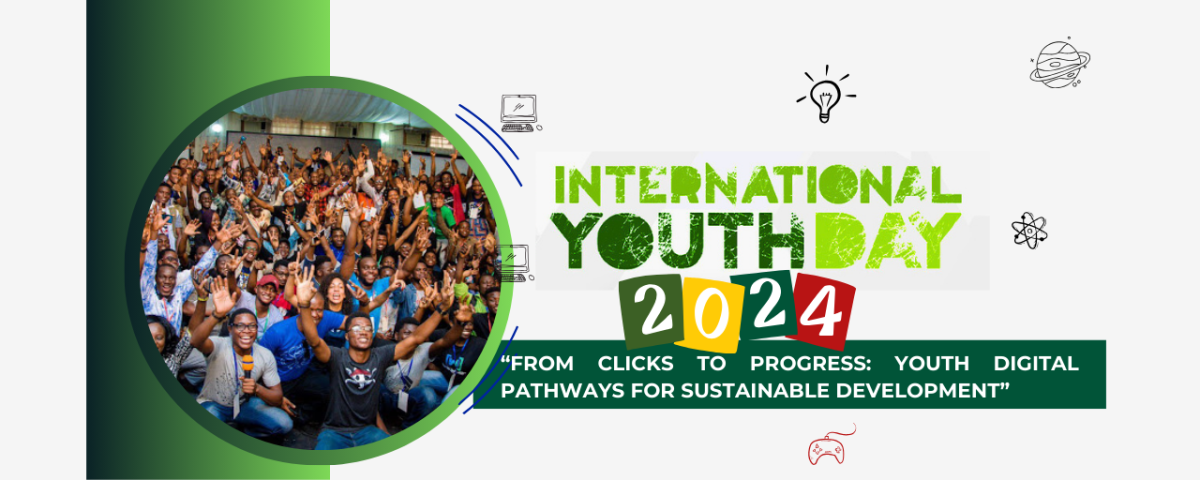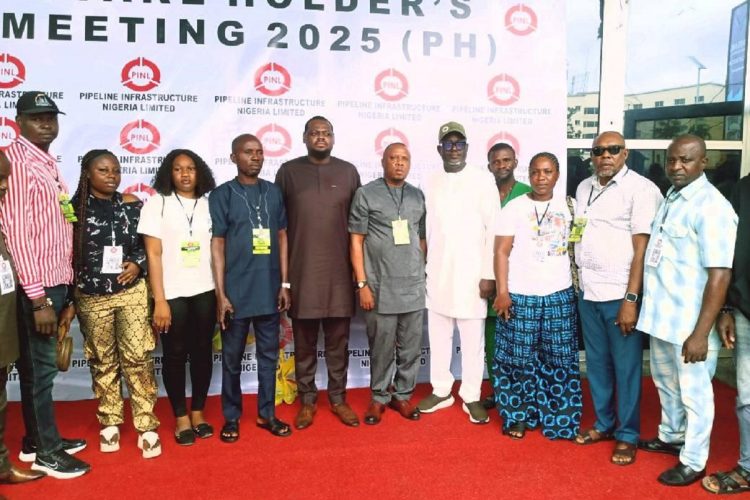
Niger Delta Weekly Conflict Update: August 04-10, 2024
August 9, 2024
Niger Delta Weekly Conflict Update: August 11-17, 2024
August 16, 2024
Digitalization is transforming our world, offering unprecedented opportunities to accelerate sustainable development. Digital technologies such as mobile devices, services, and artificial intelligence are instrumental in advancing the Sustainable Development Goals (SDGs). Data generated from digital interactions supports evidence-based decision-making, with profound impact across economic, social, and environmental dimensions. According to the United Nations, Digital technologies and data contribute to at least 70 percent of the 169 SDG targets while potentially reducing the cost of achieving these goals by up to 55 trillion Dollars.
Young people are leading the charge in digital adoption and innovation, with three quarters of those aged 15 to 24 using the internet in 2023 a rate higher than other age groups. However, disparities persist, particularly in developing countries such as Nigeria and among young people in rural areas, who often have less access to the internet and digital skills compared to their counterparts in major cities. While there is an urgent need to enhance digital inclusion, youth are largely recognized as “digital natives,” using technology to drive change and create solutions. As the 2030 deadline for the SDGs approaches, the role of young people in digital innovation is essential for addressing global issues.
Digital inclusion and how to bridge the digital divide in Nigeria have become increasingly important topics in recent years. One would assume, with the inception of the ICT revolution that the whole nation would have been digitally included by now, but on the contrary, the reverse is the case. Nigeria, being one of the most populous countries in Africa, has a rapidly growing population that can benefit significantly from increased access to digital technologies and the Internet. In today’s interconnected world, digital inclusion plays a crucial role in fostering social and economic development, empowering individuals, and bridging societal gaps.
The Niger Delta region of Nigeria Rich in natural resources, Nigeria’s nine states (Abia, Rivers, Bayelsa, Imo, Cross Rivers, Delta, Akwa Ibom, Edo, and Ondo) extend over about 70,000 km2 (27,000 sq. ml) and make up 7.5% of the country’s landmass.
There is a current shift from oil to the digital economy, where technology has virtually changed everything we do. There is a need for sustainable development, leveraging the multipliers of the digital economy to create smart, sustainable cities in the region.
However, for this transition to fully succeed, especially by involving the youth in the region’s economic development, it is crucial to address the pressing challenges of digital access and inclusion. Without overcoming these barriers, the potential for a prosperous and sustainable future remains limited.
Understanding the Digital Divide in the Niger Delta
The digital divide in the Niger Delta, characterized by unequal access to information and communication technology (ICT), disparities in access to technology, internet connectivity, digital literacy, and the ability to leverage digital tools for personal and community development, has far-reaching implications for the region’s socio-economic development, especially in an increasingly digital world.
While urban areas in the region, such as Port Harcourt and Warri, have seen improvements in digital infrastructure, many rural and remote communities remain largely disconnected. This divide causes existing inequalities, limiting opportunities for education, employment, healthcare, and civic participation. By promoting digital inclusion, we strive to create a society where no one is left behind in the digital era.
However, efforts to bridge the digital divide and promote digital inclusion in the Niger Delta, especially through youth involvement, While progress has been made, there is still work to be done to ensure that all Niger Delta communities have equal access to digital technologies, the internet, and the opportunities they bring. Below are some of the reasons why there hasn’t been equal access to digital technologies in the Niger Delta.
Factors Contributing to the Digital Divide
Infrastructure Deficits:
The Niger Delta’s challenging terrain, coupled with a history of underinvestment in infrastructure, has resulted in inadequate broadband coverage, especially in rural areas. Power supply issues further exacerbate the situation, making it difficult for residents to maintain consistent access to digital services.
Economic Barriers:
The high costs of internet services and digital devices create barriers to entry for economically disadvantaged individuals in the region, meaning that many people cannot afford digital devices or internet subscriptions. Even when infrastructure is available, the cost of access remains prohibitive for many households. Affordability is crucial to ensuring that digital inclusion efforts reach all segments of society.
Digital Literacy:
Digital literacy, the ability to effectively use digital tools and navigate online environments, is a critical component of closing the digital divide. However, many in the Niger Delta, particularly in rural areas, lack the necessary skills due to limited access to education and digital training programs.
Gender Disparities:
The digital divide is often more pronounced among young women in the Niger Delta. Cultural norms, economic dependency, and lower literacy rates among young women contribute to their lower levels of digital access and participation.
Limited local content:The availability of content in local languages that is relevant to the local context is essential for meaningful digital inclusion. The Niger Delta, with its diverse languages and cultures, lacks sufficient localized digital content, which hinders broader engagement with digital platforms. If this digital contents are within reach to the teeming yuth population, it can be efficent in tailoring developmnet ideas and activities . rewrite this to mean that if this contents are available the message of involvemnt in sustaible developmnet would be passed easily .
The Implications of These Divide
The digital divide in the Niger Delta has significant implications for the region’s development including :
- Economic Inequality:
The lack of digital access restricts economic opportunities, particularly in the growing digital economy. This perpetuates poverty and limits social mobility. - Education: In today’s world, digital tools have become essential to education, with online resources and e-learning platforms transforming how students learn. But for students in digitally disconnected areas, this technological shift feels more like a distant dream than a reality. Imagine a bright, eager student in a rural village struggling to keep up because they lack access to the internet or even basic digital devices. While their peers in connected regions benefit from endless online resources, these students are left behind, widening an already significant educational gap. This lack of access doesn’t just affect their grades; it also limits their opportunities, dreams, and future prospects.
- Health: Digital health initiatives, such as telemedicine and mobile health apps, are inaccessible to many, hindering efforts to improve healthcare outcomes in the region.
- Civic Engagement:
The digital divide also affects civic participation, as those without access to information technology are less likely to engage in governance processes, voice their concerns, or benefit from digital government services. In the 2023 elections in the Niger Delta, the participation of young people was more crucial than ever. The digital divide left many youth on the sidelines. As some engaged actively in governance, voiced their concerns, and accessed digital government services, those without access to information technology found themselves disconnected from the process. Imagine a passionate young voter eager to participate but unable to access vital election information or online platforms to voice their opinions. These digital exclusions don’t just limit their involvement; they stifle their voice and dampen their impact on shaping the future of their region.
Bridging the Digital Divide: Opportunities and Solutions
Despite these challenges, there are opportunities to bridge the digital divide in the Niger Delta:
Investment in Infrastructure:
Expanding broadband coverage and improving power supply are essential steps in closing the digital divide. Public-private partnerships could play a key role in funding and implementing these improvements.
Affordable Access:
Initiatives to reduce the cost of digital devices and internet services, such as subsidies or community Wi-Fi programs, could make digital access more affordable for low-income households.
Digital Literacy Programs: Community-based digital literacy programs are vital for equipping young people with the skills needed to participate in the digital economy. The establishment of technological facilities like Tech Creek by the Rivers State Government has significantly empowered the youth, enabling them to leverage their digital skills and competencies to contribute actively to the development of the ‘new economy’ in Rivers State. Inspired by this success, other states have also established tech and innovation hubs in their major cities. To bridge the digital divide, it is essential to extend these programs to rural areas. Organizations such as the Foundation for Partnership Initiatives in the Niger Delta (PIND) through its Youth Employment Pathways (YEP) program and the Stakeholder Democracy Network (SDN) through its digital literacy initiatives have empowered both rural and urban youth in the Niger Delta with digital skills, preparing them to contribute meaningfully to the region’s economy.
Localized Content Development:
Localized content development not only makes digital tools more accessible but also ensures that the digital transformation is inclusive, reaching the diverse population of the Niger Delta. By addressing language and cultural barriers, these initiatives can help bridge the digital divide, ensuring that everyone in the region can participate in and benefit from the digital economy.
Policy Support:
Government policies that prioritize digital inclusion, such as incentives for infrastructure and digital education, are key to sustainable progress. In 2020, the Rivers State Government, supported by PIND and SDN, drafted a youth policy document tailored to the region’s needs. This policy, modeled after the National Youth Policy, focuses on youth empowerment, education, and digital inclusion. If implemented across all nine Niger Delta states, especially on digital empowerment, this policy could significantly reduce the digital divide. It ensures that even rural communities gain access to digital technologies and education, fostering greater equity and cohesion.
The digital divide in the Niger Delta is a significant barrier to the region’s development, but it is not insurmountable. Bridging this divide will enhance economic opportunities and empower the region’s people to fully participate in the digital age. Notably, the region has seen a rise in tech and innovation startups led by youth. Since 2015, Uche Anichie has organized the Startup South event annually, with this year marking its 9th edition. This event has fostered digitalization and technological advancement, with startups emerging in Fintech, Agrotech, Healthtech, and Edutech etc. By supporting such initiatives through government and private sector partnerships, youth participation can become a cornerstone for the sustainable development of the Niger Delta. Embracing digital inclusion is not just about connectivity; it’s about creating a more equitable and prosperous future for all.









